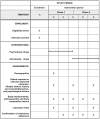Developing a machine learning algorithm to predict psychotropic drugs-induced weight gain and the effectiveness of anti-obesity drugs in patients with severe mental illness: Protocol for a prospective cohort study
- PMID: 40388412
- PMCID: PMC12088068
- DOI: 10.1371/journal.pone.0324000
Developing a machine learning algorithm to predict psychotropic drugs-induced weight gain and the effectiveness of anti-obesity drugs in patients with severe mental illness: Protocol for a prospective cohort study
Abstract
Obesity is a global public health concern, often co-occurring in patients with severe mental illnesses. The impact of psychotropic drugs-induced weight gain is augmenting the disease burden and healthcare expenditure. However, predictors of psychotropic drug-induced weight gain and the efficacy of anti-obesity drugs remain underexplored. This study aims to develop a machine learning algorithm to predict both psychotropic drugs-induced weight gain and metabolic changes, and the potential of anti-obesity drugs. We plan to enroll 300 patients with severe mental illnesses, including schizophrenia, bipolar disorder, and major depressive disorder. In Phase 1, the study will predict weight gain and metabolic changes after the psychotropic treatment. Data on demographics, lifestyle, medical history, psychological factors, anthropometrics, and laboratory results will be collected at baseline and re-evaluated 24 weeks post-treatment. Participants classified as obese (body mass index ≥ 25 kg/m²) or overweight (body mass index of 23-24.9 kg/m²) at the 24-week follow-up will proceed to Phase 2, which focuses on predicting the promise of anti-obesity drugs. The study participants will receive anti-obesity medications for 24 weeks, and the same variables from Phase 1 will be reassessed. A machine learning model will be developed to predict both psychotropic drug-induced weight gain and anti-obesity medications that will be effective. The algorithm will be tailored to each patient to guide clinicians in personalizing psychiatric and obesity treatment plans. The clinical trial is registered with the Clinical Research Information Service, part of the WHO International Clinical Trials Registry Platform (approval number: KCT0009769).
Copyright: © 2025 Lee et al. This is an open access article distributed under the terms of the Creative Commons Attribution License, which permits unrestricted use, distribution, and reproduction in any medium, provided the original author and source are credited.
Conflict of interest statement
The authors have declared that no competing interests exist.
Figures

Similar articles
-
[Psychotropic drugs induced weight gain: a review of the literature concerning epidemiological data, mechanisms and management].Encephale. 2005 Jul-Aug;31(4 Pt 1):507-16. doi: 10.1016/s0013-7006(05)82412-1. Encephale. 2005. PMID: 16389718 Review. French.
-
Managing comorbid obesity and depression through clinical pharmacotherapies.Expert Opin Pharmacother. 2016 Aug;17(12):1599-610. doi: 10.1080/14656566.2016.1198776. Epub 2016 Jun 24. Expert Opin Pharmacother. 2016. PMID: 27280311 Review.
-
Melatonin, Liraglutide, and Naltrexone/Bupropion for the Treatment of Obesity and Medication-Related Weight Gain.J Psychosoc Nurs Ment Health Serv. 2015 Jun;53(6):19-22. doi: 10.3928/02793695-20150526-02. J Psychosoc Nurs Ment Health Serv. 2015. PMID: 26091546 Review.
-
'Why getting fat, Doc?' Weight gain and psychotropic medications.Aust N Z J Psychiatry. 2001 Jun;35(3):315-21. doi: 10.1046/j.1440-1614.2001.00891.x. Aust N Z J Psychiatry. 2001. PMID: 11437804 Review.
-
Pharmacotherapy for psychotropic drug-related weight gain.J Psychosoc Nurs Ment Health Serv. 2008 Jul;46(7):15-8. doi: 10.3928/02793695-20080701-06. J Psychosoc Nurs Ment Health Serv. 2008. PMID: 18686592 Review.
References
-
- World obesity atlas 2022. London: World Obesity Federation; 2022. [Cited 2024 September 3]. Available from: https://s3-eu-west-1.amazonaws.com/wof-files/World_Obesity_Atlas_2022.pdf.
-
- World Health Organization. Regional office for the Western Pacific. the Asia-Pacific perspective: redefining obesity and its treatment. Sydney: Health Communications; 2020. https://iris.who.int/handle/10665/206936
MeSH terms
Substances
LinkOut - more resources
Full Text Sources
Medical

